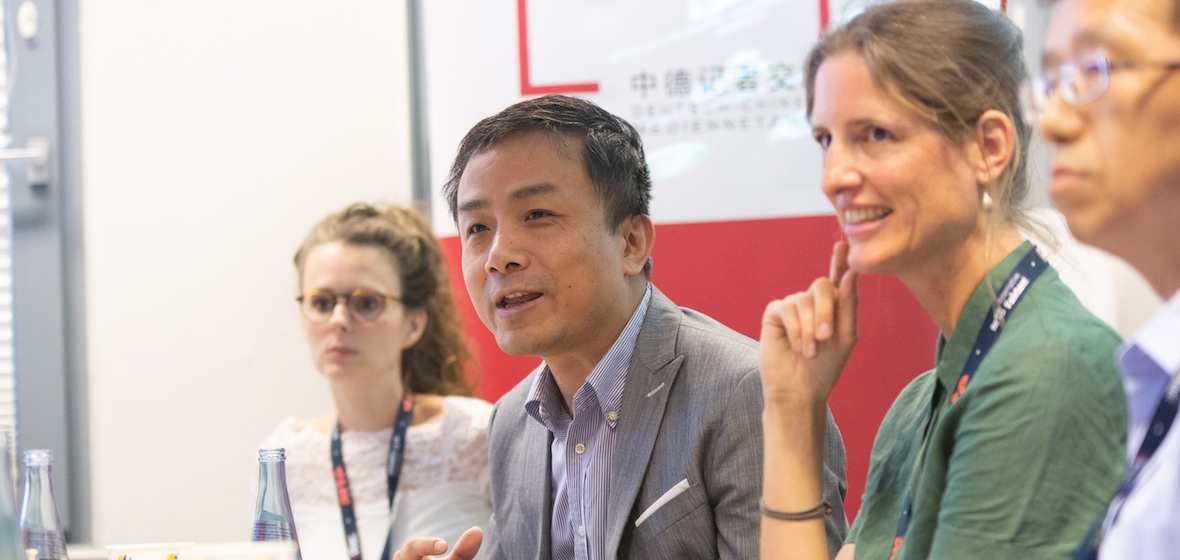Bernhard Pötter: Beyond the Green Paradise – Challenges in Environmental Journalism in Germany
14.09.2014
Visiting Beijing in the summer of 2013, I met a colleague working for a Chinese daily. He seemed a little frustrated when we talked about our work. And he had good reason for this: Just the other day, he told me, one of his stories on the coal industry had been censored. In an article he was not allowed to quote an environmental NGO on the subject, because that NGO had been put on a “black list” by the Ministry of Propaganda. Even though – or maybe because – the NGO had done some extensive research on the topic and was providing some very interesting facts and opinions. So his article was published, but without the critical input from this NGO.
An incident like that is almost impossible in Germany. The freedom of the press and other media is widely accepted and respected. Of course there are many attempts to influence what is being written and broadcast by many lobbying groups, companies, politicians and other parties. But a direct censorship by a Ministry would be a remarkable political scandal.
So is everything fine with environmental reporting in Germany? Surely not. But the problems and challenges are quite different from the Chinese situation. Because Germany has quite a different political and economic system where “green” issues are widely accepted and seen as necessary. Sometimes even more than that: Eco issues have the reputation of remembering society that under the surface of consumerism, growth and wealth we do have some huge challenges ahead.
In my view, the main challenges for “green reporting” in Germany are:
1. There is a huge influence of companies and industry on the media. They exert this influence via paid commercials. If a newspaper financially relies on customers from certain industries, the journalists will tend to be more cautious reporting on those companies. But industry also is a factor by the sheer volume of information. Every company of a certain size and importance will have a press section to hand out information about their business – but also to try to control their image. They invite journalists for background briefings, special interviews, interesting trips to make them see their angle of an issue. This is of course no risk in itself, but some sort of indirect propaganda.
2. The same of course is true for any kind of lobbying: Journalists have been under the influence from the “green” side also. Not only from NGOs like Greenpeace, WWF, BUND, but also from a growing lobby from renewable energies or “bio-agriculture”. Things have become much more complicated than the typical polluter-victim-relationship. For a journalist working under deadline pressure it is sometimes not so easy to determine and question the reliability of a “green” source.
3. Visible impacts from environmental problems have largely vanished from Germany. Rivers and air are pretty clean, the forest is growing again. The first and direct access to environment stories (acid rain and dying forests), the individual impact on people´s daily lives, have been replaced by invisible threats (chemicals, nuclear, climate). Media consumers as well as journalists and editors seemingly find a “world in the balance” and no smokestacks when they look out of the window.
4. The frame of reporting has changed: Consumers have moved from being witnesses and victims of environment stories to being actors. Sometimes, or rather often, the normal consumer does not keep up with her or his ideas of working or shopping for a better world. For the media it means to sometimes tell their audience that their choices (concerning holiday flights, the use of energy or the consumption of meat) are not as green as the consumers tend to think of themselves. This again, is not popular among the media: telling your own constituency some inconvenient truths.
5. The “green press corps” is shrinking: Newspapers, magazines and other media struggle with the competition from internet media. Less editors are being employed, the pressure is rising to come up with fast, simple and personalized stories. Time for background research is being cut away.
6. As problems get more complex, the interpreters of these problems, the journalists, have less time and resources to research and report them. Less and less experienced “green” journalists are kept on the payrolls, as papers have closed down their eco-beats or the whole publishing house itself.
7. There is a tendency to write green lifestyle-stories rather than “tough” political issues, because the audience seems to be fed up with green politics. Magazine covers with climate issues sell badly, covers with “green” cooking/gardening/lifestyle are bestsellers. The age of doom and gloom in the headlines is over.
8. New story lines come into the focus when the old green issues have been told over and over again. The recent rise of climate change skepticism in Germany is largely due to media that have been looking for a new angle on the story without paying much attention to the question of accurate and fair reporting. As a means to distinguish oneself from the crowd, it is one strategy to question the “green consensus” in Germany.
9. There is a decoupling of environmental and social Issues. The social impacts of pollution are underreported, partly because pollution is invisible these days. But an issue like poorer people living in areas with more smog, more noise and more pollutants has vanished from the headlines.
10. Most of all: The global implications of German policies and economic activities are largely underreported. The significance of German policy in the positive (e.g. as a role model for and exporter of renewable energy technology) and negative sense (e.g. German export subsidies that kill small farm businesses in African countries) is underestimated. Although quite international by comparison to US standards, green reporting is still “too German”.
11. The importance of the EU in the environment/agriculture/energy/climate/fisheries areas is not well understood. German media tend to report on green issues without seeing Brussels as an important player. And if they take into account the EU, they often tend to focus on seemingly “crazy” Brussels regulation (like the ban of powerful vacuum cleaners above 1600 Watts, for example) without seeing the member-states´ interests behind them.
12. We lack a successful independent national eco magazine. Greenpeace Magazine, zeozwei or Geo have only very limited political impact. A German Ecologist would be a good idea.
13. Parts of the media and political scene have a twisted idea of sustainability. The concept itself, though officially high on the political agenda, is inconsistent and hardly understood by the people. Everyone knows “Nachhaltigkeit”, but no one sees its importance for actual day to day decisions. The media lack colleagues who are able and have time to thoroughly think through these concepts, read through scientific volumes of paper and then think about their implications for daily life and politics.
14. Another “castrated” from of sustainability is largely accepted: that there must be an equal balance between ecological, economic and social issues to reach a sustainable development. By forgetting the fact that the environment is the precondition for economic and social development, media tend to be too balanced in their views on decisions affecting those three dimensions.
15. One problem is as dangerous for “green” reporting as it is for many other aspects of journalism: “shifting baselines”, i.e. getting used to changes for the worse when they happen slowly. People (and journalists) tend to accept losses and restrictions when they get used to them slowly. This already happened for example to the idea that it is perfectly normal to be able to drink water from a creek or even from a river, or to the idea that city streets are being built for people, not for cars.
16. A green self-destroying prophecy: Germany has labeled itself so often the world champion in green issues that the majority of the audience (and large parts of the media) take this for granted. However, when you indulge too overly in being a world champion, there is a danger that you stop practicing and lose your edge.
14th September 2014
 Bernhard PÖTTER is Senior Editor Environment, Energy, Climate at taz – die tageszeitung, Berlin. His books include “Ausweg Öko-Diktatur?” (“Solution Eco-Dictatorship?”) and “Stromwechsel” (“Change of Energy”).
Bernhard PÖTTER is Senior Editor Environment, Energy, Climate at taz – die tageszeitung, Berlin. His books include “Ausweg Öko-Diktatur?” (“Solution Eco-Dictatorship?”) and “Stromwechsel” (“Change of Energy”).
